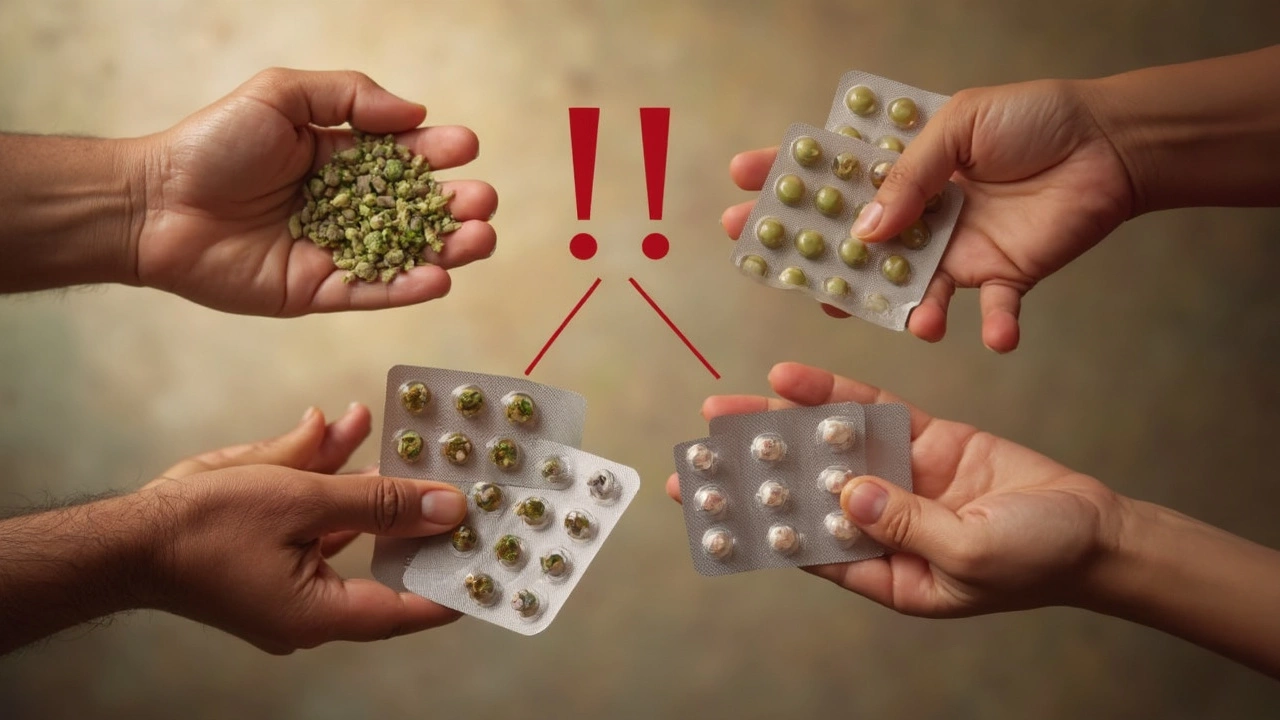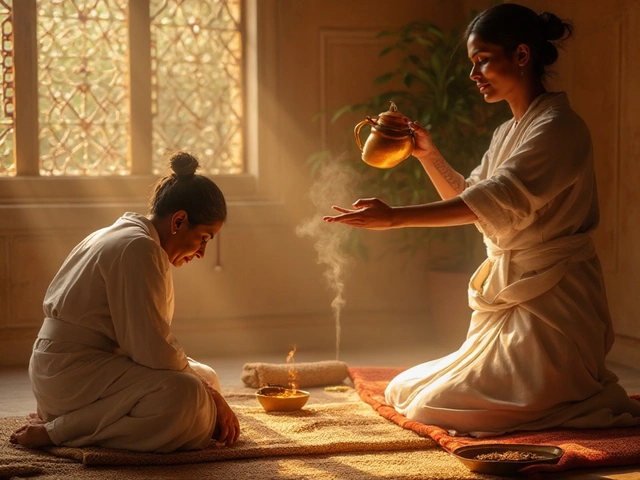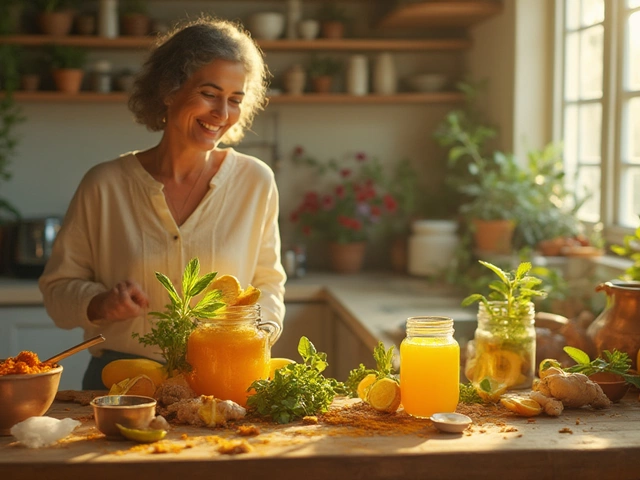You wouldn’t mix random cleaning chemicals in your kitchen, right? Wrong combos can make a mess—or worse. The same goes for herbs. Just because they’re natural doesn’t mean mixing them is always safe, especially if you don’t know how they work together inside your body.
Plenty of folks grab two or three herbal supplements hoping for big results, but the truth is some herbs can actually cancel each other out, or team up in not-so-great ways and give you bad side effects. Picture taking St. John’s Wort for mood, then adding ginkgo for focus, and suddenly you’re dealing with headaches or messing with your medication. It’s more common than people think.
- Why Herbal Combinations Matter
- Common Herbs That Clash
- Hidden Dangers: Unexpected Reactions
- The Role of Medications and Pre-Existing Conditions
- Quick Tips to Stay Safe with Herbs
- When to Ask for Expert Help
Why Herbal Combinations Matter
Mixing different herbs might sound like a shortcut to better results, but it can actually set you up for trouble. Every herb has its own way of working in your body. When you toss a few together, they can clash or double up in ways you don’t expect. Think about it like mixing energy drinks and coffee—you might end up feeling worse, not better.
For instance, certain blood-thinning herbs, like ginkgo or garlic, can make bleeding risks much higher when used together. Toss in fish oil, which is also a mild blood thinner, and you’ve got a recipe for easy bruising or nosebleeds. Another big one? Both valerian and kava are used to chill you out, but stacking them can knock you out, mess with your coordination, and make you groggy all day.
| Herb | Main Effect | Possible Problem When Mixed |
|---|---|---|
| St. John’s Wort | Mood booster | Messes up prescription meds, raises side effects when combined with other mental health herbs |
| Garlic | Blood thinner | Increases bleeding risk with ginkgo, fish oil |
| Kava | Relaxation | Too much sedation with valerian or alcohol |
If you think the science isn’t real, the National Center for Complementary and Integrative Health warns:
"Combining herbal supplements can increase health risks, especially if you’re taking prescription medicines or have chronic conditions."
This isn’t rare stuff, either. According to a 2023 survey in the U.S., almost 20% of people using herbal supplements mixed two or more in the same week and nearly one out of ten had side effects they never expected.
Bottom line—herbs can work for you, but mixing them with a ‘more is better’ mindset can backfire. Think before you blend.
Common Herbs That Clash
People often think natural means safe, but that’s not always true with herbs. Some herbal supplements don’t play well together—and when you mix the wrong ones, your body can pay the price. Here’s a breakdown of common combos to avoid and why they cause problems.
- St. John’s Wort & Ginkgo Biloba: Taking these together might mess up how your blood clots. Both herbs thin the blood, so the risk of bruising or bleeding goes way up. If you’re on meds like aspirin, this combination is a double whammy.
- Garlic & Ginseng: Both are favorites for energy and heart health, but mixing them can drop your blood pressure too low or make you bruise more easily.
- Valerian & Kava: These are both used for anxiety and sleep. Double-dosing can seriously slow your nervous system and leave you groggy, dizzy, or even unsteady on your feet the next day.
- Ginger & Turmeric: Everyone loves these for inflammation, but together they thin your blood a bit too much, especially if you already take blood thinners.
- Licorice Root & Stimulant Herbs (like guarana or yerba mate): Licorice can raise your blood pressure; add stimulants and you could feel jittery or even trigger heart issues.
Here’s what these clashes can look like in real life:
| Herb Combo | Potential Risk |
|---|---|
| St. John’s Wort + Ginkgo Biloba | Bleeding, bruising, headache |
| Garlic + Ginseng | Low blood pressure, nosebleeds |
| Valerian + Kava | Extreme drowsiness, poor coordination |
| Ginger + Turmeric | Too much blood thinning |
| Licorice Root + Guarana | High blood pressure, anxiety |
If you ever catch yourself combining more than one supplement for the same result—like better sleep or sharper focus—it’s time to pump the brakes. Mix-ups can sneak up on you, especially if you try making your own blend. Using a single supplement at a time is safer and makes it easier to spot if something’s off. And if you're curious about any herbs interaction, it’s smart to double-check with reliable sources or your pharmacy.
Hidden Dangers: Unexpected Reactions
Mixing herbs can sometimes cause problems you’d never see coming, even if you’ve read the bottle a hundred times. The big issue? Most herbal supplements don’t get mixed together in clinical trials, so there’s a lot we just don’t know until something goes wrong. Sometimes, combining the wrong herbs triggers side effects that are way worse than either herb alone.
Here are some known mix-ups that can seriously backfire:
- St. John’s Wort and ginkgo: Both claim to help your brain, but taking them together can boost your risk for headaches, dizziness, and even speed up your heart. If you’re already on an antidepressant, this mix cranks up your risk for nasty mood swings or even serotonin syndrome.
- Garlic and ginseng: Both are thought to help with blood circulation, but use them together and you might thin your blood too much. That makes things like nosebleeds, bruises, and even dangerous bleeding more likely, especially for anyone already taking blood thinners.
- Echinacea and licorice root: Echinacea fires up your immune system. Licorice can raise your blood pressure. Combine the two and now your immune system is on overdrive and your blood pressure climbs unexpectedly. Folks with autoimmune issues or heart problems should steer clear of this duo.
- Valerian and kava: Both are chill-out herbs used for sleep or anxiety. Trouble is, doubling up can hit your nervous system pretty hard, causing extra drowsiness, confusion, or liver issues if it's a long-term habit.
Mild stuff like a bellyache or headache is common, but some people end up in the ER with fast heartbeat, trouble breathing, or even liver failure. Also, some herbs block the way your liver breaks down regular medicine, so you could end up with too much or too little of your prescription drugs in your system.
To play it safe, always look up herbs interaction before trying a new combo. Don't just trust what you read on a health forum. Labels and online articles often skip these hidden dangers.

The Role of Medications and Pre-Existing Conditions
This is where things really get tricky. If you’re taking any prescription meds, you have to be extra careful with herbs. Some herbs can change the way your body processes medications, and others can make your health problems worse. Just because a product is labeled "natural" doesn’t mean it plays nice with everything, especially if you already have health issues.
Take warfarin, a blood thinner, for example. If you mix it with ginkgo biloba, you raise your risk of bleeding big time. Garlic and ginseng can also make warfarin work too well, leading to the same problem. People on diabetes meds need to watch out too—herbs like fenugreek or bitter melon can lower blood sugar even more, sometimes to dangerous levels.
If you’ve got high blood pressure and take meds for it, avoid licorice root. It can actually hike up your numbers, undoing your hard work with the prescription. St. John’s Wort is famous for causing trouble, too. It speeds up how your liver handles lots of drugs, from birth control pills to antidepressants, making them way less effective. Before adding herbs interaction to your routine, check how it’ll go with your medication.
According to the National Center for Complementary and Integrative Health, "Herbal products can affect how your body handles other drugs, sometimes leading to serious or even life-threatening complications."
Got a health problem—anything from heart disease to thyroid issues? Herbs can sneak in and cause flare-ups or side effects, so always double-check. You don’t want to accidentally set off a blood pressure spike or heart rhythm problem because you thought a tea would help.
| Medication/Condition | Herb(s) to Avoid | Possible Result |
|---|---|---|
| Blood thinners (Warfarin) | Ginkgo, Ginseng, Garlic | Dangerous bleeding risk |
| Diabetes medications | Fenugreek, Bitter Melon | Low blood sugar episodes |
| High blood pressure meds | Licorice root | Raised blood pressure |
| Antidepressants/birth control | St. John’s Wort | Reduced medication effect |
Here’s a quick tip: If you ever start a new med or supplement, tell your doctor or pharmacist about EVERY herb and pill you take, even if you think it’s no big deal. They know the weird interactions and what could go wrong. That’s the best way to avoid those hidden dangers and keep your body safe.
Quick Tips to Stay Safe with Herbs
Herbal supplements can help, but only if you use them smartly. Here’s how you can cut down your risks and keep your routine safe:
- herbs interaction is a real thing: Some herbs, like St. John’s Wort and ginkgo, can affect how your body handles medications. For example, St. John’s Wort can make birth control or antidepressants less effective. Ginkgo might thin your blood too much if you’re already on aspirin or warfarin.
- Stick to one new herb at a time: When you want to try something, start with just one supplement. This way, if you feel off or notice a side effect, you’ll know what caused it. Mixing a bunch at once is like rolling dice with your health.
- Check for possible overlaps: Don’t take two herbs that do the same job, like valerian and kava for sleep, or ginseng and caffeine for energy. Doubling up can crank up side effects—or just waste your money.
- Use trustworthy sources: Always buy your supplements from places you trust, and look for brands that test for quality and purity. Skip anything without clear labels or with wild claims.
- Don’t go off-label with the dose: More isn’t always better. Overdoing even the most common herbs (like licorice root or echinacea) can mess with your blood pressure or your liver.
- Tell your doctor the truth: Be upfront about everything you take, including herbs and vitamins. If you’re getting surgery, let your surgeon know—some herbs can mess with anesthesia or increase bleeding (looking at you, garlic and ginkgo).
For most people, sticking to these simple tips will keep herbal supplements working for you instead of against you. If something feels off, stop and ask for advice. Your body will thank you.
When to Ask for Expert Help
Here’s the deal: sometimes you really do need an expert. Sure, you can Google a lot, read labels, and even swap stories with friends, but there’s a point where that’s just not enough. If you’re mixing supplements and unsure if you’ve hit on one of those risky herbs interaction combos, it’s best to call in a pro.
If you take prescription drugs—especially blood thinners, antidepressants, blood pressure meds, or diabetes pills—it’s smart to talk to a doctor, pharmacist, or herbalist before adding anything new. Take ginkgo, for example. On its own, it’s pretty popular, but mixed with blood thinners like warfarin, the chance of internal bleeding shoots up. That’s not something you want to mess around with.
- If you notice weird new symptoms (think: racing heart, dizziness, bruising, or upset stomach) right after starting a new herbal mix, don’t just shrug it off. Get expert advice right away.
- If you’re pregnant, breastfeeding, or dealing with a chronic illness, do not gamble on herb combos. Your body can react differently, even to “safe” herbs.
- If you’re planning to have surgery, tell your doctor about every herbal supplement you take. Stuff like garlic or ginseng can affect how your blood clots, which surgeons need to know about ahead of time.
- If a combo promises dramatic results—like crazy-fast weight loss or super-high energy—step back and check with a real professional. If it sounds too good to be true, it probably is.
The reality is, most doctors these days know at least the basics about common herbal supplements, and pharmacists are trained to catch possible interactions. If you want really in-depth advice, find a certified herbalist or a naturopathic doctor who’s got experience in both herbs and prescription drugs. There’s no shame in asking—that one appointment could save you a lot of trouble down the line.





